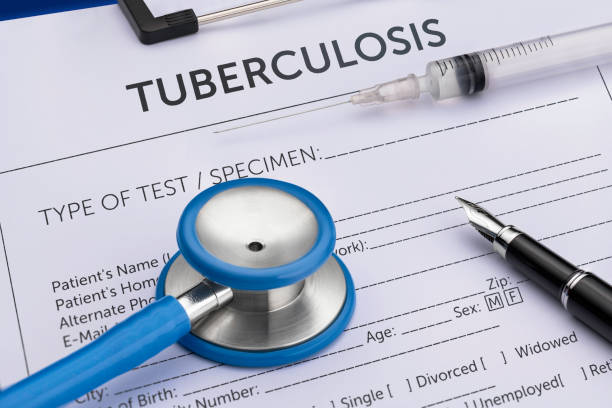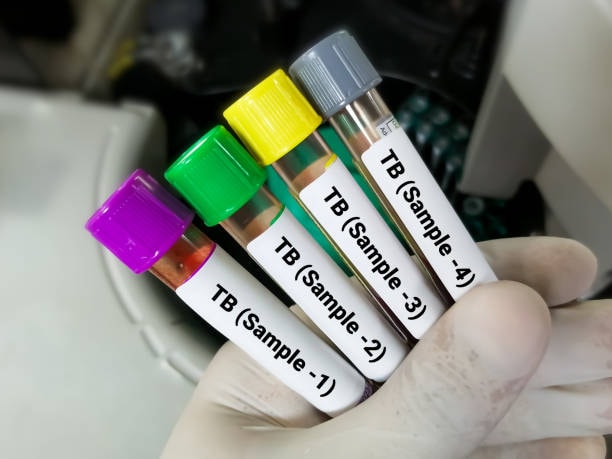
TB Test Guide: Types, Procedure, Cost, and What Your Results Mean
Time to read 8 min
Time to read 8 min
Tuberculosis, or TB, is a disease caused by bacteria called Mycobacterium tuberculosis, which is a specific bacterium responsible for the infection. Usually, it affects the lungs, but it can also affect other parts of the body, like the brain, spine, or kidneys. It can be cured with certain antibiotics; however, you need to take medicine for several months, usually 6 months or more. Make sure you finish all your medicines and complete the prescribed course even if you feel better early.
TB testing is important for health care as it helps detect if someone has tuberculosis bacteria in their body, even if they don’t feel sick or experience visible symptoms.
Usually, Doctors ask for TB Testing, especially for children :
Here are the various types of TB Tests that can help diagnose tuberculosis infection:
The TB blood test checks if you have TB bacteria in your body, even if you don’t feel sick or have significant symptoms. Instead of putting something under your skin (like the TB skin test), this test just takes a small blood sample from your body.
A medical professional draws a small amount of blood from the vein in your arm, and then the sample is sent to the lab. In the laboratory, the experts examine how your immune system responds to tuberculosis bacteria. If your body reacts strongly, it may be a sign of TB infection, and if there is no strong reaction, it is probably that you are not TB-infected.
Individuals who got the TB vaccine (BCG) should get a TB blood test, as the skin test may show a false positive result. Generally, health workers and medical professionals are regularly tested for TB.
A positive TB blood test means you are infected with the tuberculosis bacterium, but it doesn’t mean you have active TB infection. You may be asked for a chest X-ray or other tests to diagnose whether the TB is active or latent.
TB blood test price and cost usually range between INR 700 and INR 3900, which is necessary for accurate diagnosis. The test prices may vary depending on the city, laboratory, health package, and other factors.
The TB skin test checks if you have been infected with the TB bacteria (the bacteria that cause tuberculosis). It’s done by injecting a small amount of fluid just under the skin of your arm and then checking your skin a few days later.
A medical professional injects a small amount of a substance called tuberculin just under the skin on your forearm, leaving a small bump on your skin. You need to come back after 2-3 days so the doctor can check the spot and measure the bump, to check how your body reacted to the test.
If there is no bump or a very small bump, it usually means you do not have TB. Whereas, if there is a larger bump, it may suggest a positive TB skin test, indicating that you have been infected with TB bacteria. It does not always mean you’re sick; it could be latent TB, which means the bacteria are in your body but not active.
People who need to get tested for TB skin test include healthcare workers, individuals with weak immune systems, people experiencing TB symptoms (persistent cough, fever, nd weight loss), and people in close contact with TB-infected individuals.
TB skin test cost and price details in India range between INR 150 to INR 300. The exact cost may vary depending on the city, diagnostic center, and other factors.
A TB screening test is a quick check to see if you might have tuberculosis (TB), a disease caused by bacteria that mostly affects the lungs. It helps doctors find out if you’ve been infected, even if you don’t feel sick or have symptoms.
TB screening is the first step; it doesn’t confirm TB 100%, but it tells the doctor if they need to do more tests. Think of it like a smoke detector; it informs you that something might be wrong, even if there’s no fire yet.
You may need a TB screening test if you are in close contact with a TB patient, have symptoms (persistent cough, fever, night sweats, or weight loss), have a weak immune system, or are visiting another country.
TB screening is important for early detection of TB before it spreads and becomes severe, to prevent infection, and to help treat the infection before you feel sick. TB can be latent (quiet, not making you sick) or active (you feel sick and can spread it). Screening helps catch both.
A screening test is a quick check to see if someone might have a disease, even if they feel completely fine. Its for people without visible symptoms, catch a problem early, before it becomes serious. If the result is positive, you may need more tests to be sure.
A diagnostic test is done to confirm if a person really has tuberculosis disease. Usually, it's done after a screening test or when someone has symptoms. It offers a clear yes or no answer and helps doctors decide the right treatment.
Various TB test processes involve different processes, as mentioned below.
A small amount of fluid (called tuberculin) is injected just under the skin on your forearm. The injection might feel like a little pinch, which is normal. After 2 to 3 days, you return to the doctor or clinic, and the doctor checks your arm to see if there is a bump or swelling. The size of the bump helps the doctor decide if your test is positive or negative.
A small blood sample is taken from your arm, just like a regular blood test. The blood is sent to a lab for testing, and looks for signs that your immune system has reacted to TB bacteria. You get your results in a few days, and you don’t need to come back for a second visit (unlike the skin test).
If your test is negative, it usually means you don’t have TB infection. If your test is positive, your doctor may ask for more tests, like chest X-rays or sputum tests, to check if the TB bacteria are active.
TB Skin Test (Mantoux Test): This test is very cheap and usually costs around INR 75 to INR 100. Many government hospitals and clinics offer this test for free or very low cost.
TB Blood Test (IGRA Test): This is a new and more accurate test, usually costs around INR 1,500 and INR 3,000 in most private Laboratories.
Other tests (like chest X-rays and sputum tests): These can cost extra, but are often free or low-cost at government health centers.
TB Skin Test Results: A positive skin test means you’ve been infected, but it doesn’t always mean you are sick with TB disease right now. You might have “latent TB” (bacteria are in your body but not active).
TB Blood Test (IGRA) Results: The blood test shows if your immune system has reacted to TB bacteria. A negative result means you likely don’t have TB infection. A positive result means you have been infected with TB bacteria. Like the skin test, a positive blood test does not always mean active TB disease — you may have latent TB.
If your TB test is positive, it means the TB bacteria are in your body; however, this doesn’t always mean you are sick. You might have latent TB — the bacteria are there but “sleeping,” and you feel fine. Or you might have active TB — the bacteria are making you sick and can spread to others.
Your doctor will do more tests to find out if you have active TB disease or latent TB infection, such as a chest X-ray to see if your lungs look affected or a sputum test to check the spit you cough up for TB bacteria.
If you have an active TB infection, you need to start treatment right away. Treatment usually lasts 6 months or more with special medicines. It’s important to take all your medicines properly so you get better and don’t spread TB to others. You might need to stay away from others for a little while, especially at the start of treatment, to stop spreading TB.
On the other hand, if you have a latent TB infection, you feel fine and don’t spread TB to others, which is crucial for disease control. Your healthcare provider might suggest medicine to prevent TB from becoming active in the future, and you will be asked to come for regular check-ups.
TB tests can detect past TB infections through the presence of TB bacteria in the body.
It depends on the patient's specific risk factors; for instance, low-risk patients may need a single test while high-risk individuals need regular health checks or annual TB testing.
Yes, many countries ask visitors to provide their TB test reports. Moreover, certain professions, including healthcare professionals and people living in high-risk places, such as correctional facilities, need to provide their TB test reports.
TB is a transmissible disease that can easily spread from the infected person to other healthy people through coughing and sneezing. Detecting TB early is important for effective treatment, to prevent the spread of the disease, and to reduce the risk of drug resistance. Follow your TB treatment religiously for the prescribed duration, even if you feel better early, to prevent the return of the infection. If the symptoms become worse or you experience any drug interactions, consult your healthcare provider.
***Medical Disclaimer - The following information is for educational purposes only. No information provided on this website, including text, graphics, and images, is intended as a substitute for professional medical advice. Please consult with your doctor about specific medical advice about your condition(s).
